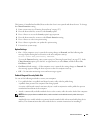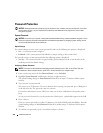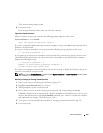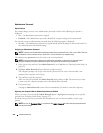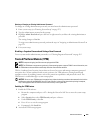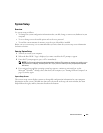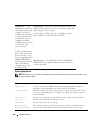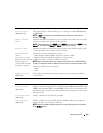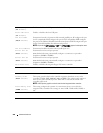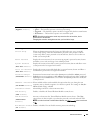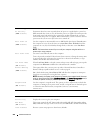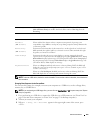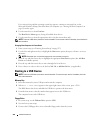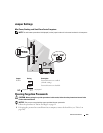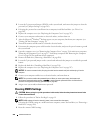
Advanced Features 259
Drives
Diskette Drive
(
Internal
default)
This option enables or disables the floppy drive. The options are Off, USB, Internal,
and Read Only.
NOTE: If USB is selected, ensure that USB Controller setup option under Onboard
Devices is set to On.
SATA 0 through
SATA n
Identifies and enables and disables the drives attached to the SATA connectors on the
system board and lists the capacities for the hard drives.
NOTE: These options appear as SATA 0 through SATA 3 for the mini tower, SATA 0 through
SATA 2 for the desktop, and SATA 0 and SATA1 for the small form factor.
External SATA Identifies and enables and disables the drives attached to the eSATA connector on the
system board and lists the capacities for the hard drives.
SATA Operation
(
RAID
Autodetect/AHCI
default for mini tower and
desktop computers)
(
AHCI default for small
form factor computers)
Options for mini tower and desktop computers:
• RAID Autodetect/AHCI (RAID if signed drives, otherwise AHCI)
• RAID Autodetect/ATA (RAID if signed drives, otherwise ATA)
• RAID On (SATA is configured for RAID on every boot)
NOTE: When in Autodetect mode, the computer configures the drive as RAID if a RAID
signature is detected on the drive. Otherwise the drive will be configured as AHCI or ATA.
Options for small form factor computers:
•AHCI
•ATA
SMART Reporting
(Off default)
This setting determines whether integrated drive errors are reported or not during
system startup.
Onboard Devices
Integrated NIC
(On default)
Enables or disables the integrated NIC controller.
Settings are
Off, On, On w/ PXE, or On
w/RPL. When the On w/ PXE or the On w/RPL setting is active, if a boot routine is not
available from the network server, the computer attempts to boot from the next device in the
boot sequence list.
Integrated Audio
(On default)
Enables or disables the onboard audio controller.
USB Controller
(On default)
Enables or disables the internal USB controller. No Boot enables the controller but
disables the ability to boot from a USB device.
NOTE: Operating systems with USB support will recognize USB floppy drives regardless
of the No Boot setting.



